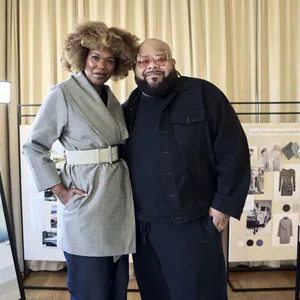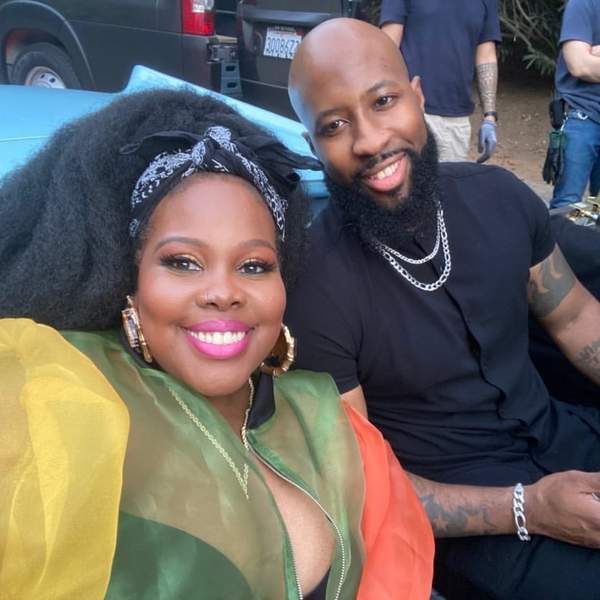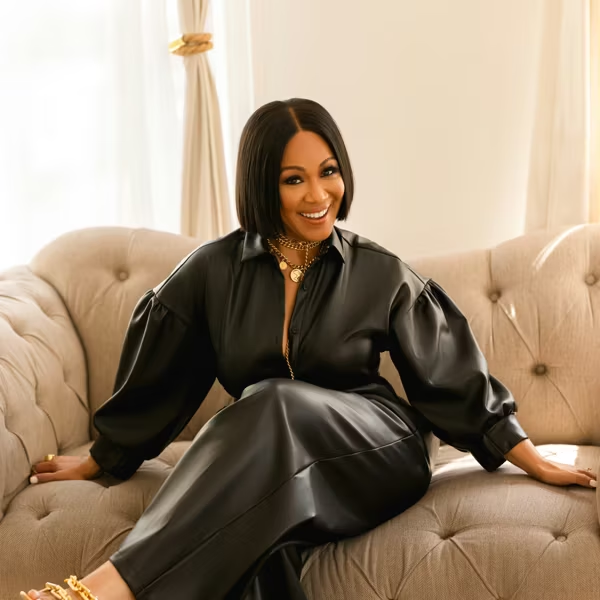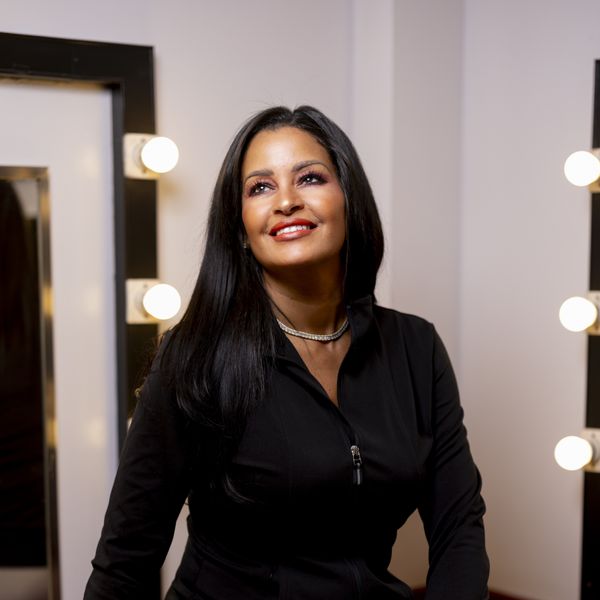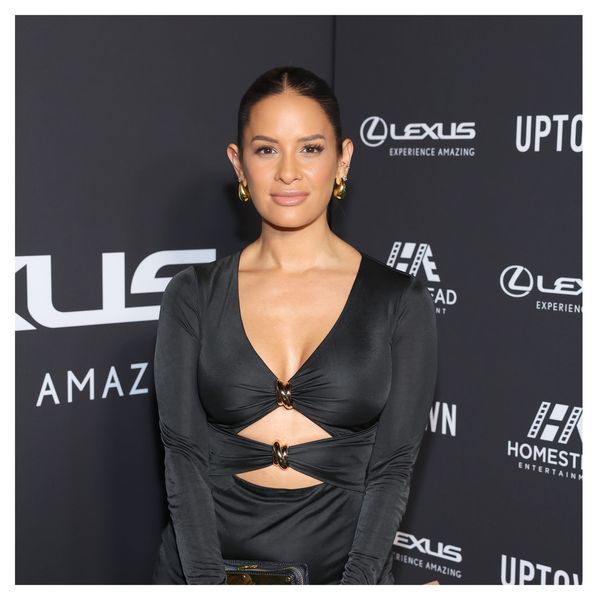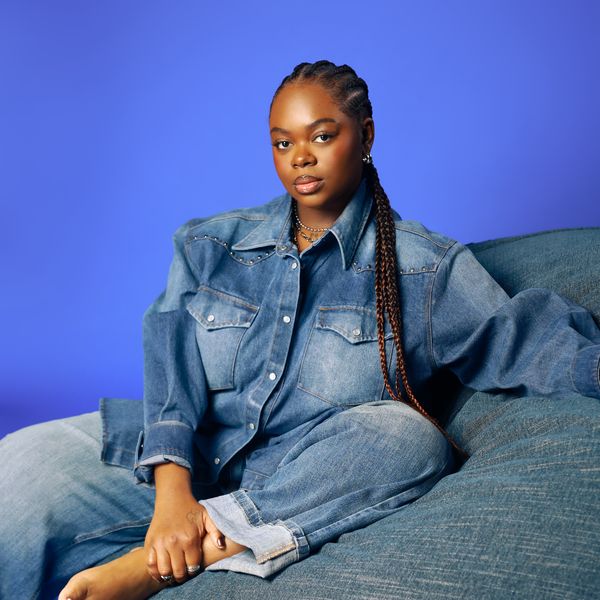While most of us got our introduction to Amber Riley back in 2009 as Mercedes Jones on the critically acclaimed show Glee, she has reemerged as a spicy, confident songstress fully capable of taking on the music industry one note at a time. Her self-titled debut EP, RILEY, includes the timeless "BGE", which stands for "big girl energy", and the melodious "A Moment", tribute to her late friend and Glee castmate Naya Rivera. The Compton native has received celebrity endorsements from industry powerhouses including Zendaya, Jazmine Sullivan and Chloe x Halle, while her six-track project climbed to the number two spot on iTunes' R&B Albums chart upon its release in early October.
In addition to being one of the most undeniable talents on screen and in the booth, she is a loving partner to her now-fiancee Desean Black. Though most women choose to wander down the traditional route, Riley channeled her BGE and slid into the DMs of her future fiance. Because she took a chance on herself, the friendship and her future relationship was able to flourish. In this exclusive interview, xoNecole spoke with Amber Riley about tapping into her sensuality, how she feels her sexiest when she's with Desean, and the lessons she's learned throughout her twenties to make her the confident woman she is today.
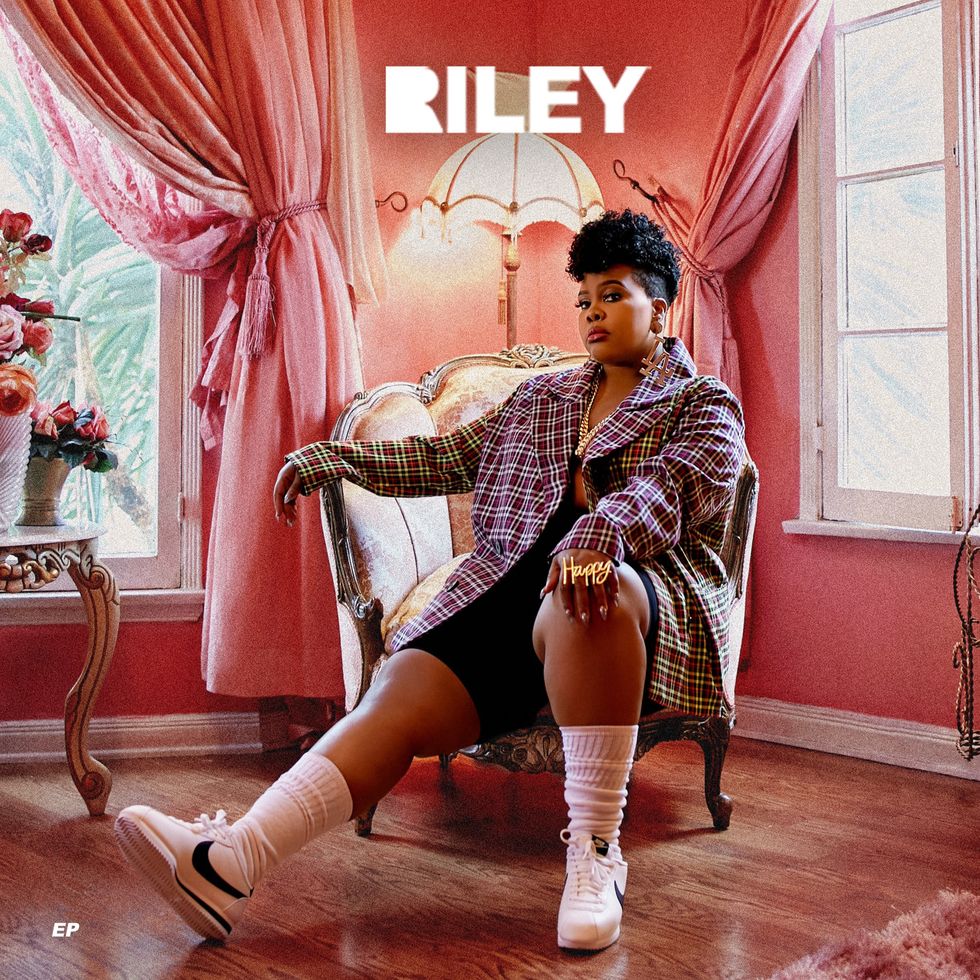
Official 'RILEY' cover art
Justin Frazier
xoNecole: This year, a lot of women have been going through a shift during the pandemic and the year made a lot of people sit with themselves about who they are, what they want to do and where they want to be in life. Was that the case for you, and what shifted in your life this year in comparison to when we had all the distractions before the pandemic?
Amber Riley: It made me more mindful, more conscious and aware of my mental health and myself. It helped me realize that a lot of the things and distractions that keep you from paying attention to the things you need to change into your life were eliminated, which is what I think everybody was feeling. Not even just women, but men too. Personally, it made me pay more attention to myself and my own needs. Sometimes even my own flaws and the things I needed to work on personally.
Your lead track is “BGE”, which stands for “big girl energy”. Tell me a little bit about what “big girl energy” means to you.
It means literally taking care of bigness. That's what big girl energy is. It's pushing past obstacles, pushing through when you want to give up or be tired. It's about not taking people's bullshit, it's about making your money, it's about being a boss, it's about taking care of yourself. Big girl energy is literally just taking all of that great energy that you need from yourself to make it through or make it to whatever you need to in life.
Yes, I love that! Speaking of energy, the energy in the video was absolute fire! It also features your current fiance! Congrats on the engagement! You’ve been private about your personal life in the past, so walk us through the decision to say, “I’m about to show off my partner, this is what it is and this is who I’m rocking with.” What made you decide to share with the world that piece of your life?
Well, he was in my music video and I was like, "You know, they're kinda gonna know anyway and it's gonna be weird if I don't say anything." This is the first relationship that I've been in that I feel is really healthy and I love him to pieces. I need people and the people that also be in my DMs to know that I'm taken, I'm spoken for and I'm giddy and in love. It's gross (laughs).
I can tell the happiness in your voice and you can really tell when genuine love is afoot. You sound genuinely happy!
Yeah, he's really my best friend. We really worked on our friendship and respecting one another. He's just a great man all around. I feel super blessed to have even met him and I'm blessed to even have his friendship. Nothing's perfect obviously, but I wouldn't want to go through the ups and downs of life with anybody else.
Before the friendship came the initial meeting and you debuted your relationship recently with a post on Instagram about “How It Started” versus “How It’s Going” about sliding in the DMs. You mentioned that you found him because of xoNecole and I’m interested in hearing that story because you have us out here hot in these streets and women think this is where all the men are because you landed one. Tell me about how that went.
I literally was just scrolling and it was a wine night for sure. I love xoNecole because you talk about women's issues and mental health, I love reading your articles and of course I love Necole, too. You had posted him and I don't know if he was a Man Crush Monday - I don't know what he was. When I saw his picture, I was like, "Oh my God, he's such a handsome man." I believe I followed him that night, and I remember scrolling through my Instagram, I saw his picture, and I was like, "Who is this guy? I don't remember following him." He was on my timeline and I was like, "Hmmm, I'm gonna say hi," and I did. I literally just said, "Hey Desean, how are you?" in his DMs.
I've also been much bolder this year about dating and putting myself out there. A lot of people don't want to put themselves out there because they fear rejection. I'm not a special case, so if the person that you're interested in is interested in you, then they're gonna respond in that way. A lot of women say, "I don't want to be thirsty going into a guy's DMs," but I wasn't thirsty and I wasn't chasing him. I just made myself seen and I made sure that he saw me and it went on from there. In our first conversation, we were talking about science, brains and nerdy shit.
"A lot of people don't want to put themselves out there because they fear rejection. I'm not a special case, so if the person that you're interested in is interested in you, then they're gonna respond in that way. A lot of women say, 'I don't want to be thirsty going into a guy's DMs,' but I wasn't thirsty and I wasn't chasing him. I just made myself seen and I made sure that he saw me and it went on from there."
It was a genuine conversation!
Yeah, it was genuine. It would be the same way if you met somebody on the streets or at a club or at a bar. You have a conversation with someone and you see the vibe. It's the same thing.
What is your advice to a woman who feels any type of way about making the first move to get a guy? That’s major big BOSS energy to go out there and get what you want when you want it!
Don't be afraid to put yourself out there if you're interested in someone. You don't know the circumstances because some guys may be a little bit shy and you could be missing your opportunity to get an amazing friend. That could be the person that you're gonna marry, the love of your life and you miss it all because of ego or pride. If the person doesn't want you, that just means the person wasn't for you but you're just making yourself be seen or available to that person. Don't think about it as chasing them. It's basically saying, "the ball's in your court," as a man, if that's what you're concerned about.
That's what women think about sometimes like, "I want him to be the man and I want him to take the initiative." I've heard that before, but honestly, if you put the ball in their court and just let them know they're interested, if that's the kind of man you want, they're going to pursue what it is that they want.
In your track, “Temporary”, you rhetorically ask if love even exists, but you were able to find love during a pandemic. Hookup culture is screwed right now but you’re able to maintain a healthy relationship. After a few failed relationships, we tend to close ourselves off to the possibilities of love, but what are ways that you learned to open yourself up and your heart so you can meet Mr. Right?
Honestly, it was through self-love. I've had my heart broken before and I dealt with rejection in different ways, but I think the self-love aspect really helped because I got to a point where I was like, "A person who did me wrong isn't going to take away my opportunity to find love." I deserve love. I deserve to be loved and you only realize that through self-love and the way that you treat yourself and knowing what it is that you have to offer. I'm not for everybody and I'm not out here trying to be for everybody either, but I do know that I bring value to myself and I've always wanted to build with someone.
I think I just got to that place where I was looking for the right thing, something substantial and not superficial, and willing to walk away if it's not the right thing instead of fearing being alone and by myself. I'm comfortable being alone. That helped me make the right decision to be with the right person.
Will Smith said, years ago, that in order to love someone, you have to be willing to collide with the weakest parts of yourself and have to look at the things about you that are cowardly, mean and resentful. With your experiences in your current relationship, how do you feel about that statement?
That honestly speaks to vulnerability. That can be a very hard thing for Black women. Unlike other cultures, Black women aren't always raised to understand that you're the prize and not raised to understand that you don't have to carry all the load by yourself. When I wrote that song "Ride", I wrote it for Black men specifically and in our community, we were never really taught to lean on one another. Vulnerability and trust is a thing that I work on all the time because it wasn't something I was taught or was demonstrated to me as a Black woman. I was taught to take care of your own, make sure that you're good, make sure that you're strong, you don't have time to cry, you don't have time to wallow, sadness is weakness - those are the things that I was taught.
Now, I'm with a man that is a leader and I trust him, and that's hard. Vulnerability was equal to weakness to me. In vulnerability, you do have to be comfortable with the person that you're with seeing your imperfections, your flaws and your failures - and that can be a very tough thing. I have that thick cap where I wanted to be perceived as a whole person and this strong Black woman, but that doesn't work. Relationships don't work without that vulnerability because if there is no vulnerability, there is no trust.
"I'm with a man that is a leader and I trust him, and that's hard. Vulnerability was equal to weakness to me... I have that thick cap where I wanted to be perceived as a whole person and this strong Black woman, but that doesn't work. Relationships don't work without that vulnerability because if there is no vulnerability, there is no trust."
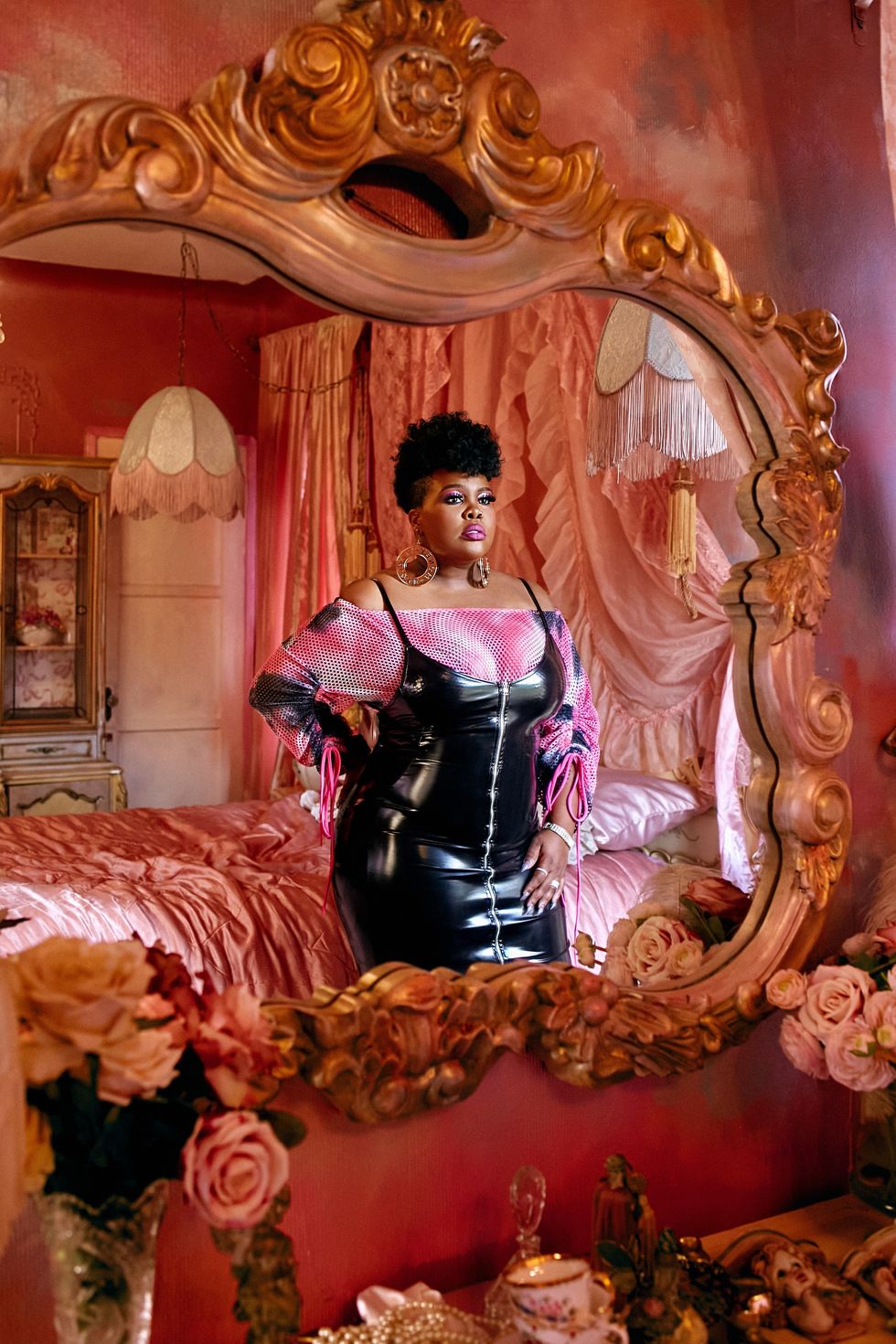
Justin Frazier
You’ve been pretty open about seeing your therapist and giving your depression a name, “Keshia”. I feel like what you did was important because what you did was humanize it and you made depression real, especially in the Black community and for Black women where it’s hard for us to accept our feelings because we don’t want to feel “weak”. How did giving depression and anxiety a name help you face “her” head-on?
I think what it did was help me to see that's not me. That's not who I am. That may be something I've dealt with or I deal with in life. It's actually very normal and I really want people to normalize it because there's a difference too in being depressed, dealing with depression and having clinical depression. Everybody deals with some level of depression or anxiety or being unsure. The more that we talk about it, we take away its power because the secrecy of it all makes it even worse.
When I named my depression "Keshia", it helped me to realize that this is not me, this is not who I am, this is something that is outside of myself that I have control of. I can't control when it comes, but I can go through the process of controlling whether or not this is going to take me down today or stop me. I don't always have a handle on it and it's not completely perfect, but naming my depression helped me to be like, "OK bitch, not today. I got shit to do today, Keshia, so sit your ass down." It gives me this power and authority that I need when it comes around.
A lot of Black women who grew up in inner cities have experienced something you have experienced as well - oversexualization and adultification during their upbringing, which shifts how they view their own bodies. How did getting male attention at an early age have an effect on how you viewed yourself and your sexuality?
It made me hate my body. Being a little more developed at a younger age is confusing because you're a kid but you're walking past men that are making comments about your body and it's comfortable. It made me want to be ugly. I felt like my body was some kind of sin, that that attention was my fault. Not the grown men who shouldn't have been commenting on a kid's body, but because I have a butt or hips or boobs, this is my fault [and] I need to cover up. It also made me eat, not care about my body, not pay attention to my body and being regrettable and treating my body badly 'cause I was upset at the fact that it gave me that type of attention.
To how you are now as a woman, you’re so confident and you own every part of you. How are you able to tap into your sensual side and be OK with being sexy during your adult years?
I'm just always really honest with myself, sometimes brutally so. I've come to the conclusion that my body is my own and I don't pay attention to what other people have to say about it. That's even if it's a compliment. I think that's why whenever people in interviews always want to talk to me about body positivity and the movement, I'm not really part of that movement. I was thrusted into that when I was on television because I was the big Black girl on TV and that's what they do. They try to make you this, what I call, Fat Black Jesus. That's what they kind of want you to be. They want to pick your body apart and pick apart its flaws, they want you to fight to love yourself and live out loud.
My body is my own and it may appear that I'm confident all the time, but I'm also more than just my body. I try to not let my body be a subject matter or consumption for other people. I'm really intelligent, I'm talented, I have other interests, and because I've talked about my body so much in my career, I've just learned to not let it be such a big subject. I don't walk around with that burden that people try to put on me about it. I think that's probably what people think. It really is just not giving a shit about what people have to say and I don't know how to explain that. I don't know if it comes with age. I'm 34 and I don't know if it's because I've dealt with so much criticism and I've come on the other end of it. I have no idea how I got there, I don't have the map and I can't really give people steps on how to get to the space of not giving a shit, but that's just where I am.
"My body is my own and it may appear that I'm confident all the time, but I'm also more than just my body. I try to not let my body be a subject matter or consumption for other people. I'm really intelligent, I'm talented, I have other interests, and because I've talked about my body so much in my career, I've just learned to not let it be such a big subject... I have no idea how I got there, I don't have the map and I can't really give people steps on how to get to the space of not giving a shit, but that's just where I am."
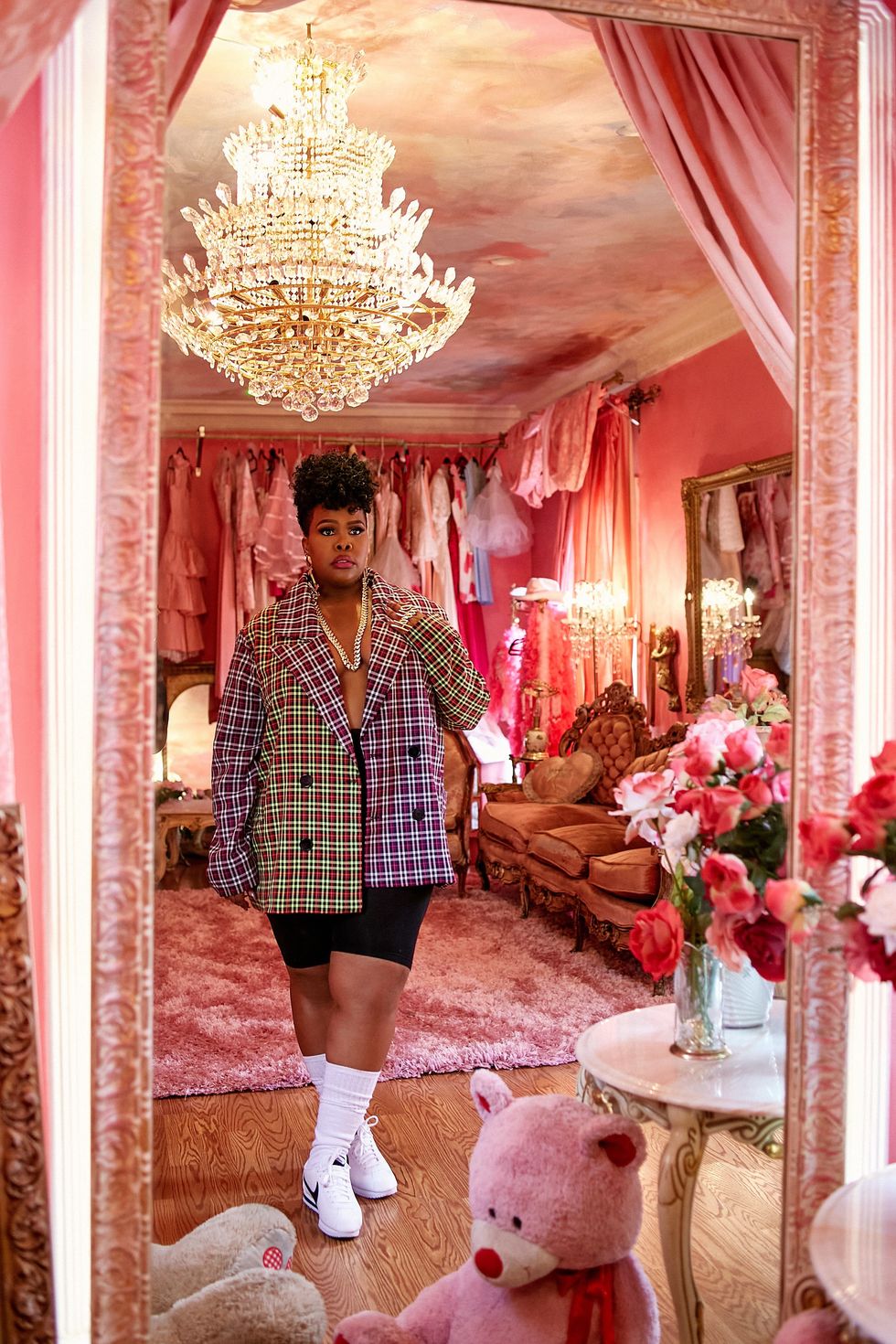
Justin Frazier
Where you are currently, how do you tap into your sensuality and when do you feel the sexiest?
Honestly, I feel the sexiest when I get out of the shower. I just like to be free and in my most natural state, I feel very sexy. At the same time, when I have my hair done and my makeup done, and I have a really cute outfit on because I love fashion and beauty, I feel super sexy too.
What does pleasure look like for you?
Pleasure for me now is just love. The love that I receive from my man is pleasurable, and that even is cuddling and watching TV. That's my happy place - sitting at home, in our room, in our pajamas or whatever and cracking up at a funny movie or him laughing at me watching a scary movie. I hate scary movies and he loves scary movies, and he makes me watch them and I'm terrified. That kind of happiness and that kind of companionship is something that I never thought that I would ever have. That's pure pleasure for me.
When you turned 30, you talked about the pressure of having kids and all of these markers that women are supposed to hit by a certain age. Do you feel that pressure now that you’re nearing 35 to have kids and get married?
I think being 34, I have learned to just go with the flow. I've learned to not really say what I will or won't do, or even sometimes what I want. There was a time where I was like, "I'm not having kids," then there was a time that I wanted kids. There was a time when I was like, "I don't mind if I'm single," then there was a time I was like, "I want to be in love." There's so many different markers in life. There's obviously some kind of pressure because as women, we are born on this Earth with the eggs that we are going to have to have birth. Men can just populate the Earth for the rest of their lives. You do keep that time in mind, and I'm honestly just OK with what God has for me.
Retrospectively, how does Amber in her 30s differ from Amber in her 20s?
There's so many things that differ me in my 30s than in my 20s. Amber in her 20s, I don't think paid enough attention to herself and her own needs. She did not say "no" enough and she didn't put herself first a lot. She didn't take care of herself the way that she should have. She was afraid of the hard stuff that she had to face to mature and grow, and I think Amber in her 30s is just finally in the place where she's OK if the things that she needs to work on hurt a little bit as long as she keeps growing.
If you could give Amber in her 20s any piece of advice with what you know now in your 30s, what would you tell her?
Invest in yourself first.
For more Amber Riley, follow her on Instagram. RILEY is available now on all streaming platforms.
Featured image courtesy of Amber Riley


